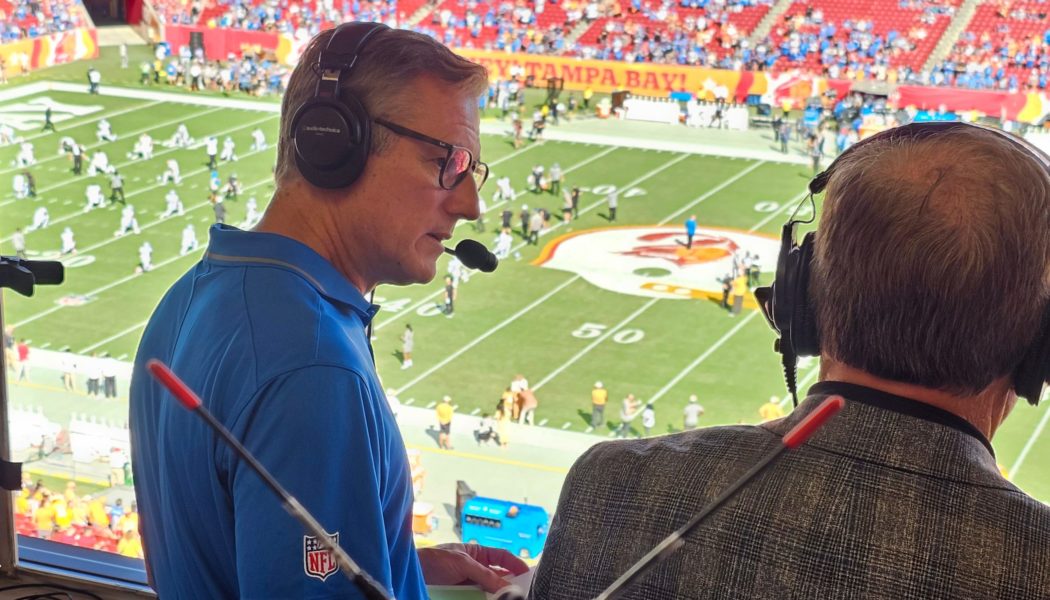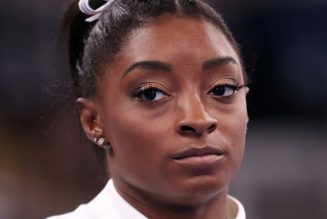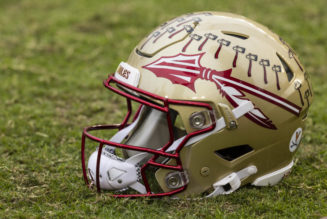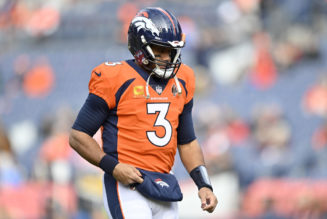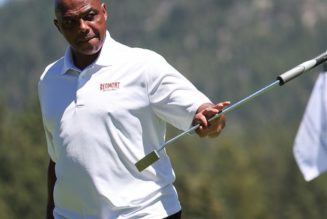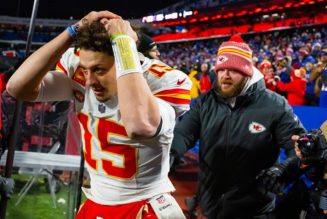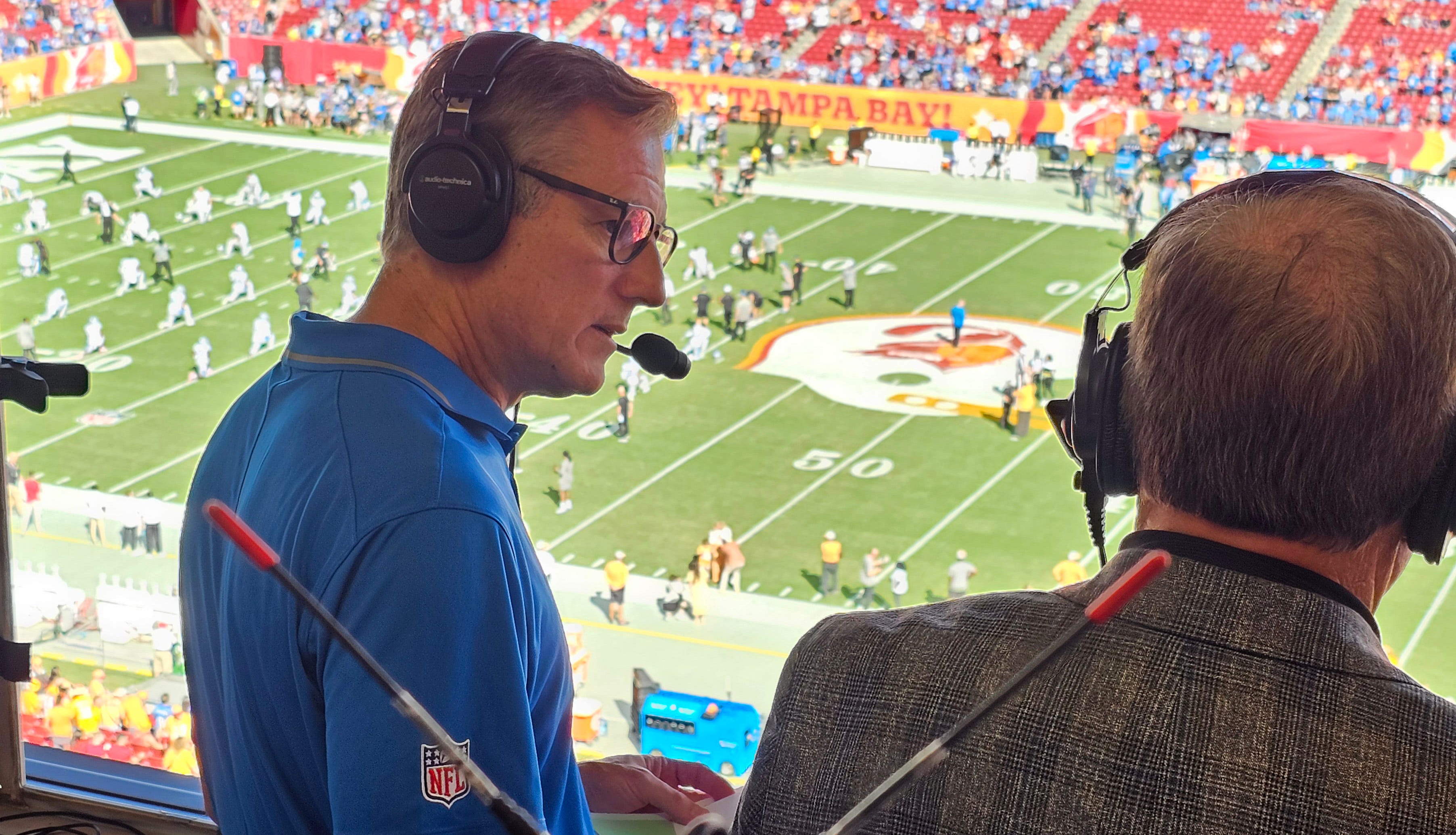
Allen Park — It’s Friday morning and Detroit Lions coach Dan Campbell finishes his final weekly press conference with local media ahead of Sunday’s game. He steps off the dais in the media room and walks out the door into a small space that leads into the facility’s entranceway, where he sits on a gray leather couch and is joined by the team’s radio play-by-play voice, Dan Miller.
The conversation starts casually before shifting to some off-record questions about the week’s injury report. Campbell provides more detail than he did a few minutes earlier to the gaggle in the media room. The coach knows the information — which Miller is using to avoid outdated questions for an interview that will air hours before kickoff as part of the pregame show — is being shared with a trusted set of ears.
Then the recorder goes on and Miller begins his introduction, which centers around a segment sponsor. A word is flubbed in those first few seconds and the recording has to be restarted.
Campbell remarks: “We’ve been doing these three years, and I don’t think we’ve ever done a second take.”
Amusingly, 30 years earlier, the first time Miller talked to a coach for a radio interview, he needed a second take that day, as well.
Few things, if any, have a 100% approval rating. Miller, as the “Voice of the Lions,” has to be pretty close.
Respected by his peers and adored by fans, many from the latter group proudly declare that they mute their televisions and sync his radio call to enhance their viewing experience, including his signature “Touchdown, Detroit Lions!” call after a score.
But few likely have an idea of what goes into Miller’s dual role of running Fox affiliate WJBK-TV’s (Channel 2) sports department and handling the play-by-play obligations, or know the journey, rooted in humble beginnings, to reach this point professionally.
When you know, you know
By the age of 8, Miller already knew what he wanted to do with his life. That’s when sports became the center of his universe — and the astronomy hasn’t changed. If he wasn’t playing a game of baseball or basketball with the other kids in his northern Virginia neighborhood, he was consuming every morsel of sports media he could. His family subscribed to two newspapers. He’d devour the Washington Post’s sports section in the morning and stand at the end of his driveway to take the Washington Star directly from the deliveryman’s hands in the afternoon.
But what trumped the written word was watching Warner Wolf, a local anchor for the CBS station, bombastically deliver the day’s sports news. And the crown jewel was Wolf’s Monday night recap show for the local NFL team, “Redskins Sidelines.”
“It was must-see TV for me when I was 9, 10, 11 years old,” Miller said. “I literally just loved everything about it.”
It didn’t take long for Miller to realize he wanted to grow up and be just like Wolf. And even before Miller got to George Mason University, where he’d pursue a degree in broadcast journalism, he found a way to get his foot in the industry’s door. Through a family connection, he learned of an opening at the local office for the nationally syndicated Mutual Broadcasting System, which later became Westwood One. A few months from his high school graduation, Mutual hired him to be a weekend producer, a pair of eight-hour shifts helping piece together the station’s sports programming.
That became a full-time job with the station during his junior year of college. When initially offered that position, Miller wasn’t ready to take it. He wanted to finish his degree first, but when they threatened to give the job to someone else, Miller shifted his class load to the evening in pursuit of his dream.
By the time he finished college, he was working as part of the station’s road crew for their college football game of the week, which was taking him to many of the nation’s top campuses. And it was during that time he got his first chance to be an on-air talent, interviewing coaches for their pregame show.
That’s where our time machine from that gray couch in Allen Park takes us to Miller’s first one-on-one. It’s 1985, Columbia, S.C., and he’s been tasked with talking to prickly University of Michigan coach Bo Schembechler.
“I had been told by people to kind of be careful. He can be a little tough, so just try to get in and get out,” Miller recalled. “So, they’re coming in for their Friday walkthrough, I’m there an hour-and-a-half early, just sweating because it’s an early-season game (between Michigan and South Carolina), and I’m shaking in my boots. They bring him over and I start my interview and the first sentence comes out backwards.
“I said, ‘Coach, I’m going to have to start over.’ He puts his arm around me and he goes, ‘Son, just take your time; it’s fine.’ That was really cool. In that moment, it probably saved my career, because I felt like I was about to melt into a puddle.”
Whether Miller’s career would have been derailed before it got going, without Schembechler’s kindness, is debatable. But in 1997, when Miller landed in Detroit, it coincided with Michigan’s run for a football national championship. So, when he found himself in close quarters with Schembechler while covering a Rose Bowl event in Los Angeles, Miller couldn’t help but share the memory with the retired coach.
“I said, ‘I just want you to know, you were my first big interview, and you really saved me,'” Miller said. “I told him the story about him putting his arm around me and saying, ‘Son, take your time.’ He steps back and goes, ‘Ha, I should have told you to f— off.’ It was just great.”
Unexpected turns
Miller spent 11 years with Mutual, but he had bigger ambitions, even if he had to travel lower roads and unexpected paths to reach them.
He had been doing plenty of on-air work as a fill-in toward the end of his run with the company, but when offered the opportunity to have his own show with an emerging local station, WTEM in Washington, D.C., he jumped at it — even if it meant taking a significant pay cut to host the overnight slot, which aired from midnight to 5:30 a.m.
He must have been doing something right because less than three months into it, WTEM offered Miller their beat job covering the local NFL team. Only he wasn’t interested. He had jumped ship to be an on-air personality, and this would take that away. Management gave him a day to reconsider, and when he reiterated that preference, the assignment was no longer an option.
“I came back after 24 hours and said, ‘I want to be a talk show host. I came here to do that,'” Miller said. “They said, ‘Well, you’re going to be a beat reporter.'”
It turned out to be a fortuitous twist.
“It’s funny; that was one of the best things that ever happened to me,” Miller said. “I got to know everybody in the market and kind of became a regular contributor when somebody would call up, ‘Hey, we want you to come on TV and talk about the team.’ It was kind of my back door into TV.”
TV is what Miller always wanted to do. Remember, that’s the medium where Wolf had captured his imagination as a child. Those guest appearances Miller was making got him a call from another D.C. outlet, the Fox affiliate Channel 5. They had fired their pregame host midseason and needed an immediate replacement. And after convincing management at WTEM that they’d benefit from the extra exposure, Miller finally found himself with his first regular television job in 1994.
The next step was a weekend anchor position for Channel 7, D.C.’s ABC affiliate. Coincidentally, they were going to hire Wolf for that opening, but an issue with his previous contract kept him from accepting.
His loss was Miller’s gain.
“I get that job, I go to the radio station, where (Wolf) was also working, doing some updates and I think some work with Tony Kornheiser, and the first person I see is Warner Wolf,” Miller said. “He just says to me, “Hey, man, I’m so happy for you. This is a great move for you. Good luck with it.’ He could not have been more sincere and great. Yeah, it was a full-circle moment.”
Wolf, long retired and now living in Florida, didn’t remember the details of that interaction. Still, Miller’s recounting meshed with how Wolf said he would have handled the situation.
“I always felt you should be nice to the people coming up in the business because when I was coming up, people were nice to me,” Wolf said.
As it turns out, Miller shares that aspect of Wolf’s legacy, as well.
Road to the present
Miller landed in Detroit two years later. He’d been looking to take the next step for years, and despite sending his tape out for dozens of TV openings around the country, nothing had materialized. The only offer he got was an intriguing one from ESPN. They wanted him to come work for ESPN News, with a planned path to become a SportsCenter anchor. But the career move would have come with another pay cut — at a time he couldn’t afford to take one.
“That guy told me I was making the mistake of a lifetime not taking it,” Miller said. “…They were phenomenal, but between the TV that I was doing in D.C. and the radio I was doing in D.C., I was making good money, and this would have been less money. I had a young family, and it just didn’t feel like the move for me at the time. You definitely had nights where you lay in bed and wondered if that was the right decision.”
Two months later, Detroit came calling out of the blue. Miller hadn’t applied for Fox 2’s sports director opening. Instead, Neil Goldstein, who had been brought in to revamp the struggling station, found Miller’s tape through a head-hunting firm based in Dallas, similar to how the Lions discovered their current general manager, Brad Holmes.
In a time before everything was digitized, Goldstein flew to Dallas and watched the tapes of dozens of candidates for Fox 2’s vacancy, but Miller quickly emerged as a favorite. For years, Goldstein thrived in his role because of his eye for talent, and he couldn’t figure out why Miller didn’t already have a full-time job in a major market. In his early 30s, Miller had it all — the good looks, the commanding voice and the required depth of knowledge.
“He was so perfectly well-rounded, never a hair out of place, always sharply dressed,” Goldstein said. “His delivery, his story selection, his ability to do interviews and ask the right questions, every aspect of Dan as a sportscaster was spot-on.”
But a deal almost never came together, unbeknownst to the involved parties until now. Goldstein reached out to Miller’s agent, who hemmed and hawed on her client’s behalf for the next 48 hours, trying to maximize the offer. But Goldstein, on a tight deadline ahead of the station’s relaunch and worn out from a series of similar negotiations, was in no mood for games. He gave Miller’s agent a harsh ultimatum.
“I said to her, ‘Listen, you have 20 minutes to get on the horn with him and decide whether he wants the job in Detroit or not. If I don’t hear back from you in 20 minutes, I’m giving the job to somebody else,'” Goldstein recalled. “I didn’t have anybody else. I wanted Dan, but I needed to rattle their cage.”
Miller, on the other hand, said he knew it was the job he had been waiting for, the moment he first got a call from his agent. Only now is he learning the offer was almost pulled.
In the end, rationality between the parties prevailed, and Miller and his family relocated to Metro Detroit. And even though Goldstein moved on from Fox 2 a few years later and has since retired, he confidently names hiring Miller one of the best decisions of his career.
“I’ve hired probably several hundred people over the years in my time as a manager at TV stations,” Goldstein said. “I would put Dan right at the top of the heap among the greatest hires I ever made. … From the day he walked through the door, I loved the guy. He couldn’t have been friendlier, affable, cordial. He got along with everybody. Never a problem.”
Chasing a second goal
With one dream realized, Miller would soon find the door open to chase a second.
“Young me, who first started going into press boxes at 18, I would sit there and watch the play-by-play guys walk in, and it was like they were walking on air,” Miller said. “It was the most amazing thing to see them. They’d walk in, have their briefcases, and you’re looking at them thinking, ‘Man, these are the play-by-play guys.’ Then they’d go into the booth where I couldn’t go, had never been, and that door would shut. I’d be like, ‘Wow, one day I would love to be able to walk into that booth.'”
Miller had done some play-by-play in D.C. but only small-potato assignments. He called some high school games for his alma mater, Virginia powerhouse Flint Hill, as well as at George Mason. His first chance to call a football game was for NFL Europe. But whatever glamour his younger self envisioned, this wasn’t it.
Three plays into his first game, Miller’s spotter — the person responsible for helping identify the uniform numbers involved in the previous play — got overwhelmed and walked out on the job without warning. Then, the matchup was hit with a 90-minute weather delay. Without commercial breaks built into the DirectTV broadcast, Miller and his color analyst, Jeff Lageman, literally and figuratively had to weather the storm.
But for those 90 minutes, Miller reverted to his talk-radio background, working in interviews with the referee and coaches from the locker room. His poise under challenging circumstances impressed Fox executives, earning him the chance to do play-by-play for some NFL games for the network, starting with the 2000 season opener between the Saints and Lions.
The Lions’ radio role, where Miller is now in his 19th season, came five years later. And like his job at Fox 2, the position largely found him. When the team’s radio rights had expired, a local station making a bid to acquire them pitched Miller to take over as the play-by-play voice, unbeknownst to him. That bid didn’t win, but the Lions were keen on the idea, and former team president Tom Lewand approached Miller to gauge his interest.
The Lions already had an established and accomplished play-by-play voice in Mark Champion but felt a need to change for two reasons above all others. First, they felt he was equally, if not more identifiable, as the voice of the Detroit Pistons and they wanted a voice exclusive to the Lions.
Second, there was a planned push to expand the role year-round, which would include various duties, including emceeing team and charity events. One recent example was the dedication of Barry Sanders’ statue in front of Ford Field.
“Our thought was having somebody who could be identifiable with the organization and also extend the reach of the team on a more constant basis,” Lewand said.
At the time, Miller was a well-known commodity throughout the organization. With Fox 2 serving as the team’s broadcast partner during the preseason, he had been handling the play-by-play for those games. Additionally, he had hosted a weekly, nationally syndicated show with former Lions GM Matt Millen and had covered future general manager Martin Mayhew in Washington, D.C., when he was a player, and Miller was an up-and-coming broadcaster.
“Not only (were we) adding a great play-by-play voice to the broadcast, but also somebody of Dan’s character, talent and personality that extended into other aspects, whether that’s at a charity function, or even if he’s speaking out in town on something else,” Lewand said. “It was just him being who he is, having that affiliation with the Lions. It just seemed to make a lot of sense and created a dynamic that didn’t exist at the time.”
It made sense for Miller, too. To do TV, he had to be out of town for half the week. Switching to radio, while it carried plenty of obligations to work around, kept him closer to home most weeks, while slicing his travel time in half for road games.
And through it all, the key was always Fox 2’s flexibility.
“Fox 2 was amazing about it because I was missing things while I was gone,” Miller said. “…They just said, ‘Look, you’re still working within the family and your growth is our growth.’ I’ve always appreciated that. I owe a lot to them.”
A week in the life
The dual role keeps Miller busy. Shadowing him for a week gives just a sliver of the experience.
Starting Monday, he’s at the team’s facility for a morning interview with quarterback Jared Goff. It’s only a couple of minutes, with some brief banter before and after. During this particular week, the two talked about the direct snap to running back David Montgomery between the QB’s legs. On camera, Goff mentions making sure the ball didn’t clip his nether regions. Once the camera goes off, Miller quips, “We all know about the butt fumble, but this would have been the nut fumble.”
Too colorful for TV news but too good not to share here. And it’s a moment that highlights his comfort level interacting one-on-one with one of the organization’s most important players.
“He’s always been fun and easy to work with,” Goff said. “I think during the hard times and the fun times, he’s been the same guy. I feel like he’s consoled me when I’ve needed it and pumped me up when we’re playing well. I see those little clips of him calling the game and how passionate and into it he gets. I know it means a lot to him, so it’s nice to get to share those Mondays after wins, but even after losses, to talk through it a little bit.”
Later Monday afternoon, Miller attends Campbell’s press conference, followed by the first of three one-on-one interviews with the coach each week. This one is for the “Lions Review” radio show Miller hosts on 97.1 that evening.
Tuesday morning, Miller’s back at the facility to film a short, film-focused segment with Campbell on the upcoming opponent for Fox 2’s pregame show Sunday morning. Thursday, he does sit-down interviews with a player and one of the team’s three coordinators, and Friday, he’s got Campbell for the radio pregame.
And each of the first four days of the week, he’s at Fox 2 in the afternoon, anchoring the 5 and 6 p.m. newscasts, as well as the late-night news a couple of times each week.
Saturdays, aside from the plane ride to an away game, are the off day, setting up for a long Sunday. Of course, during this week of shadowing him, he has a dinner obligation with sponsors in Tampa, one of the extra events Lewand envisioned Miller getting looped into during the year.
For a 1 p.m. game, he’s arriving at the stadium at 9:30 a.m. for the live pregame show on Fox 2, before transitioning to the radio pregame show, the actual broadcast, a couple of postgame interviews. Then, it’s back to the Fox 2 studio in Southfield to host Sportsworks, the station’s weekly roundtable show.
It’s a wonder the man has time to eat or sleep. And it’s why he leans hard into two principles that guide him every step of the way — routine and preparation. To Miller, they are simultaneously everything. It’s part of the charm of the NFL schedule. Most weeks, it follows a predictable pattern, making routine easy.
As for preparation, Miller can’t sleep without setting himself up for the next day, even after working his fragmented 13-hour shift on Sundays.
“Usually, I’ll go home and, at that point, I’m thinking about Monday,” Miller said. “I have Goff first thing in the morning on Monday, and I know I have Campbell that afternoon for the radio show. … I want to have those interviews written before I go to bed on Sunday night, or else I’ll lay in bed and think about them, and it will bother me. It’s a good way to hit the ground running on Monday.”
Where the magic happens
Wolf, Miller’s earliest inspiration, has always understood his success in the industry was never just his own.
“I learned early you’re only as good as your surrounding cast,” Wolf said. “As an anchorman, you really had to have a good cameraman, editors and producers and directors. You couldn’t do it yourself.”
What can be lost in the chaos of a typical Miller week is how many hands play a part in its success. His is the face you see on TV, the voice you hear on your radio, and the one making the calls you remember. But he hardly does it alone. Not surprisingly, he’s eager to highlight those who help him through the process, starting with cameraman Jeff Holloway, who might spend more time at the Lions’ facility than any media member.
“Jeff and I have traveled this country doing events, and I trust him with everything I do,” Miller said. “He’s amazing. He can read my mind, we work well together, he does all this stuff with me. He’s into the areas of this building where a lot of people don’t go, the Lions trust him, he does his job. … Whenever I’m going somewhere, I want Jeff there.”
Miller’s radio and TV co-hosts, Bob Wojnowski and Will Burchfield, bring levity to the week. Then there are his bosses at Fox 2, who give him the long leash to do both jobs; his producers, Gregg Kanner and Matt Trumph; secondary cameraman Kent Culpert and reporters Jennifer Hammond and Woody Woodruff, who fill in the gaps at the station and help create all the Lions content that fills the network’s airwaves throughout the season.
“When it’s football season, the Lions are our business,” Miller said. “We have a lot to do. We have their games, we have extra programming, we have things that we have to put together that go in our shows, and it’s a group effort to get through that and get it done.”
And who can forget about the crew in the booth, who help make the magic you hear on Sunday? Miller is quick to praise two longtime staffers who aren’t part of that group this season, spotter Joe Abramson and engineer Al Rosenberg, who helped him so much during the past 18 years. Similarly, there’s former color analyst Jim Brandstatter, who welcomed Miller into the role 19 years ago.
“I came in the new guy and he was immediately accepting of me and we just had an amazing ability to work together from Day One,” Miller said. “I love him dearly.”
There’s statistician Mike Bratta, who, like Holloway, Miller credits for being capable of reading his mind. Plus, color commentator Lomas Brown and sideline reporter T.J. Lang, former Lions players who fill in Miller’s gap of knowledge with their on-field experience.
Collectively, it’s the people around him that have made Miller’s career better than anything younger versions of himself could have imagined.
“When I was going through being the young guy trying to get into the business, and it wasn’t happening, you still had dreams, but it was hard to see them coming true,” he said. “I can honestly say I didn’t know where I’d be, and I didn’t know what I’d be doing, but to be doing play-by-play and be anchoring sports at a TV station, that’s everything I dreamed of doing.
“I get paid to work with great people that I love and would want to hang out with anyway, and I get paid to watch games for a living,” Miller said. “Everything that I dreamed about doing, and at times felt like it was never going to happen, has happened.”
jdrogers@detroitnews.com
@Justin_Rogers
